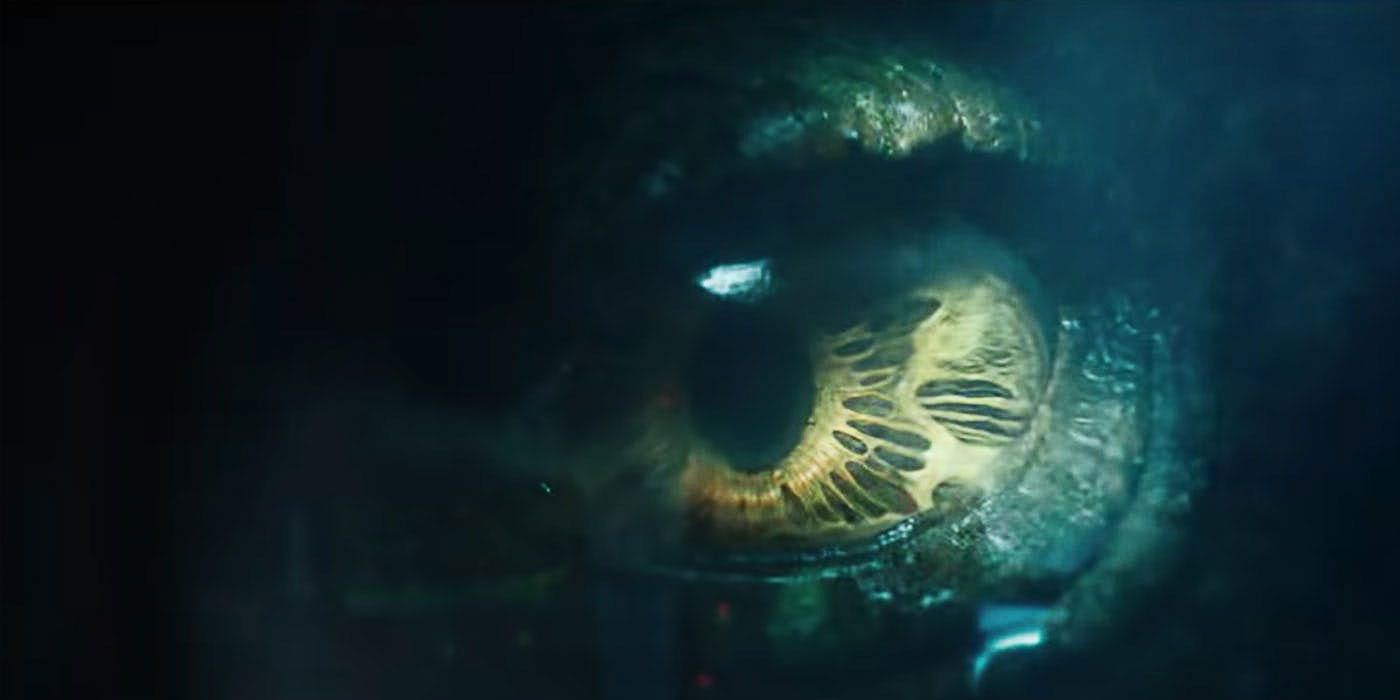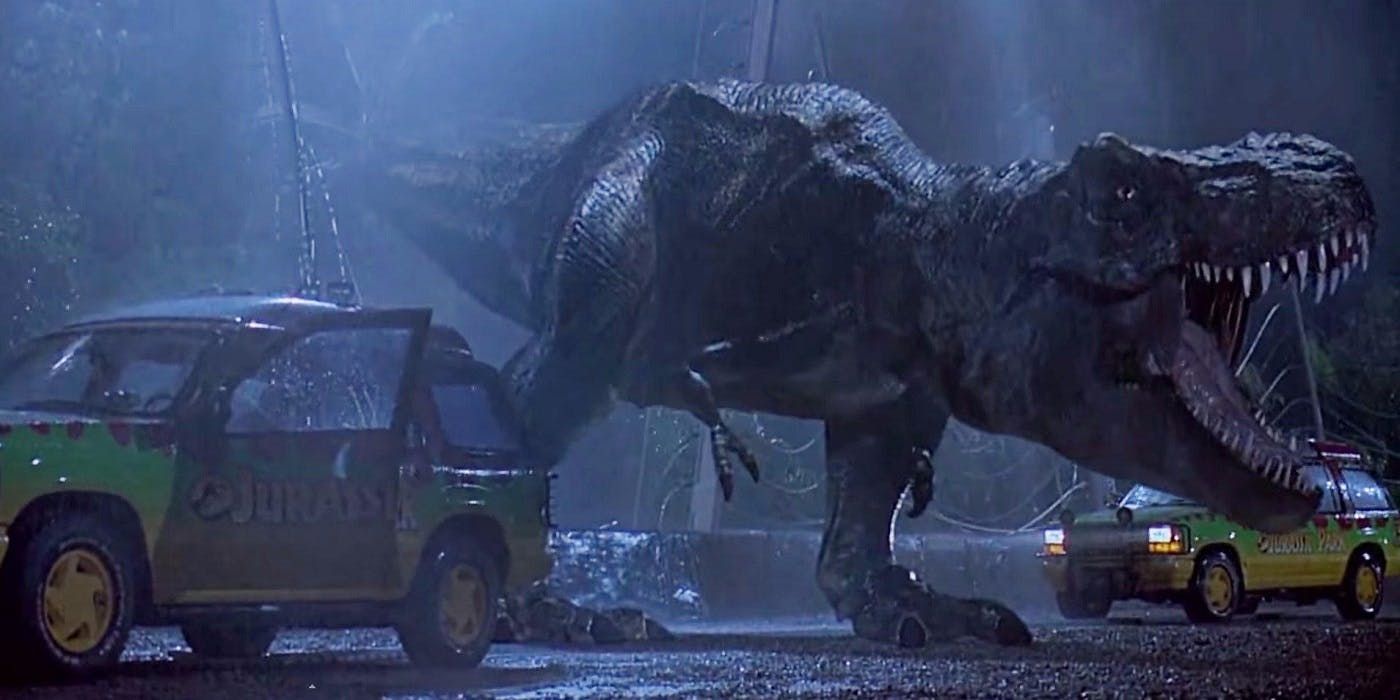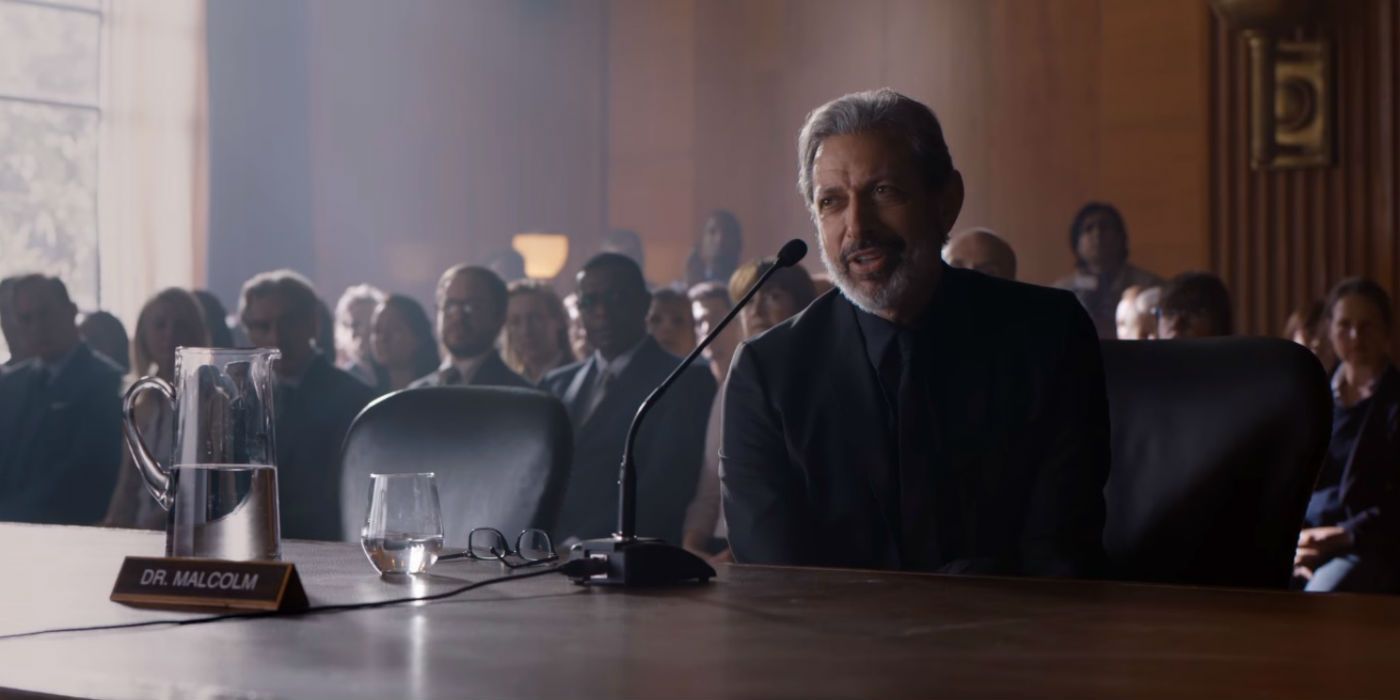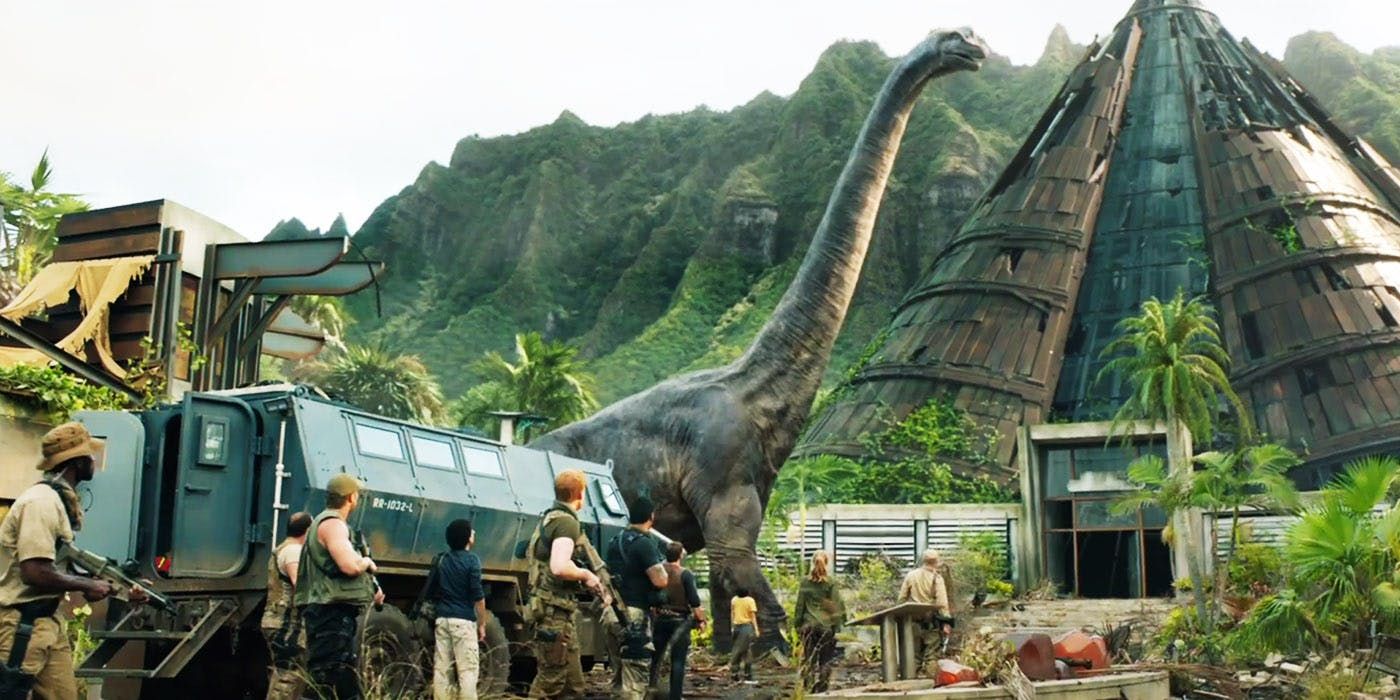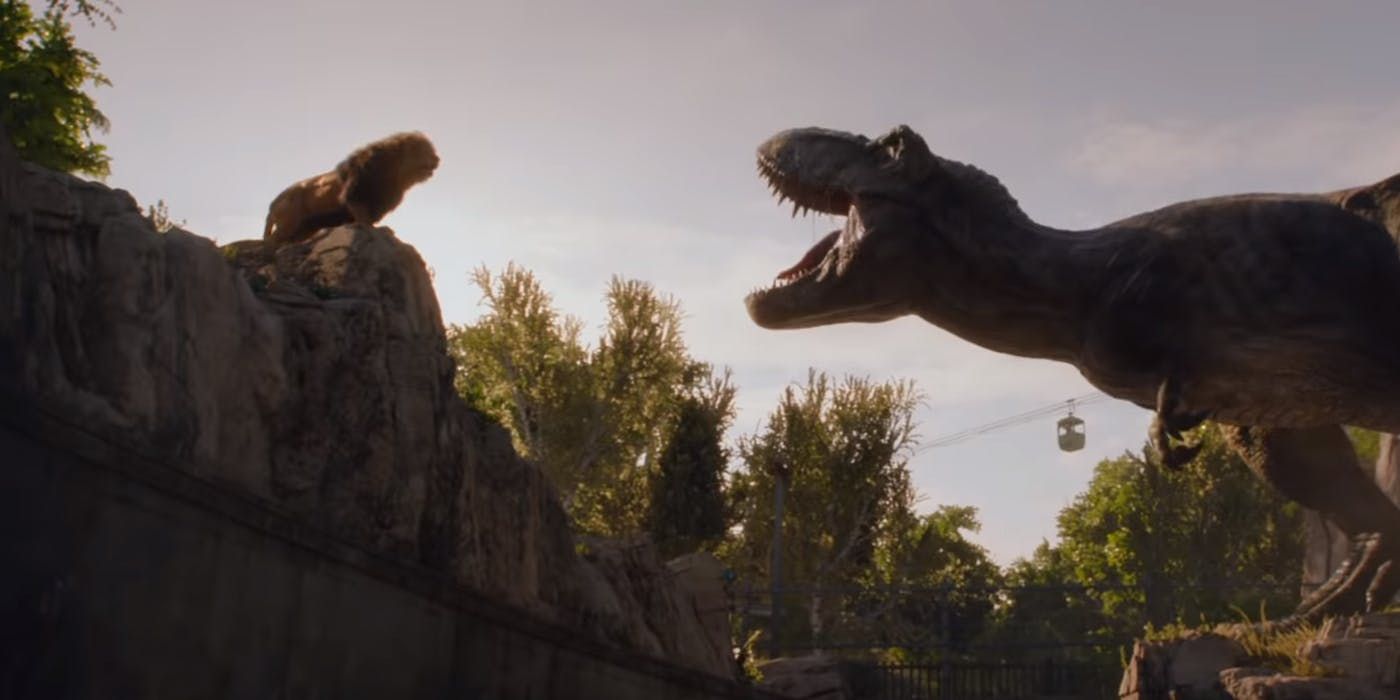WARNING: The following article contains major spoilers for Jurassic World: Fallen Kingdom, in theaters June 22.
Since 1993, audiences have flocked to theaters whenever a new instalment of the Jurassic Park franchise is released. The films won people over with thrilling scares, unforgettable shots of colossal reptiles and all the gory action any horror film fanatic could ask for. It's why the Velociraptors and T-Rex are the most well known creatures from the film series.
It's all great fun, but it also makes it tragically easy to forget that there's actually something more meaningful beneath the vicious action that almost none of the films in the franchise have been able to successfully convey, with the exception of the original Jurassic Park (directed by Steven Spielberg) and the recently released Jurassic World: Fallen Kingdom (J.A Bayona). To really appreciate how the newest film returns to the franchise to form with regards to its themes, we have to take a look back.
The original Jurassic Park was highly focused on illustrating the points of a philosophical and moral debate, much like Michael Crichton's novel of the same name, on which the film was based. The movie goes a step further than the book, altering the characters just a little bit. For example, among other changes, Alan Grant (Sam Niell) behaves like much more of an academic in the film than his novel counterpart.
More importantly, Ian Malcolm (Jeff Goldblum), who is the voice of reason in the story, is far less abrasive in the film (arguably due to Golblum's incomparable charm), which allows a real discussion to take place with little interference from emotionally charged dialogue. The crux of the film's debate takes place at the lunch scene in the first film in which the major characters discuss the ethical, philosophical and practical issues with a cavalier attitude toward science, in this case represented by potentially destructive ancient dinosaurs.
It was a great discussion, but its impact wasn't as large as it could have been because there was very little emotion behind it. It didn't help that the film essentially forgot about the conversation by the second act when all hell started to break loose on the island with the exception of one brief scene in which Ellie Satler tries to make Hammond see that he's clinging to the illusion of control. The films that followed failed to revisit the debate and focused on showcasing different dinosaurs for no other reason than because those dinosaurs are exciting to watch. The purpose behind those dinosaurs, in the context of the franchise's message, was almost lost as they came dangerously close to becoming little more than gimmicks.
Page 2: [valnet-url-page page=2 paginated=0 text='Jurassic%20World%20Resurrected%20The%20Franchise%27s%20Big%20Themes%2C%20But%20Fallen%20Kingdom%20Truly%20Explores%20Them']
When the franchise was revived in 2015 with the release of Jurassic World (directed by Colin Trevorrow), it came back with a focus on the original message by using the hybrid Indominus Rex as a means of embodying the destructive consequences of human greed and recklessness. In essence, it's easy to underestimate them. While the old themes of the franchise were brought to the forefront with the arguments between Henry Wu (B.D Wong) and Masrani (Irrfan Khan) as well as the arguments between Owen (Chris Pratt) and Hoskins (Vincent D'Onofrio), the points made never really stick because the film still focused on action and bigger teeth.
That's where Jurassic World: Fallen Kingdom has its predecessors beat. Not only does it continue the franchise's exploration into the consequences of mankind's recklessness, it does it with a lot of emotion that allows audiences to connect with everything, even the dinosaurs, on a much deeper level, which really helps to drive its themes home.
Ian Malcolm returns to the franchise to verbalize everything the film is trying to convey. He speaks to a special committee about the dangers of human interference in the natural order; in this case, natural selection in the form of a volcanic eruption on Isla Nublar. Just as he did in the original film, Malcolm once again advocates caution and non-intervention, warning that preventing the second extinction of dinosaurs would have huge consequences and mankind would have to suffer them, which is ultimately the direction in which the film went as the final act saw the release of dozens of different dinosaur species from captivity.
Their release as an event was more than just a way of keeping the franchise exciting and fresh. It was a way of arguing a point about life in all its forms. The film made a point of exploring a different side of Malcolm's argument. Maintaining that delicate equilibrium means allowing things to die. That's tough, especially since humans are, for the most part, an empathetic species.
The film proves that by allowing audiences to connect with almost every living thing shown on screen, especially the dinosaurs. This is far from the first time the franchise has attempted this, but it is the first time it has actually worked, because this time around, that emotional connection wasn't just expected by the film. It was earned. The first act debated whether or not these synthetic animals should be treated the same and while we heard the arguments from both Malcolm and Claire (Bryce Dallas Howard) -- who was leading the Dinosaur Protection Group -- audiences were allowed to decide for themselves when the events of the film took them to Isla Nublar as the volcanic eruption consumed the island.
Page 3: [valnet-url-page page=3 paginated=0 text='Jurassic%20Park%203%20is%20Poised%20to%20Explore%20These%20Themes%20Even%20More%20Deeply']
Aside from Blue, who has been developing as her own character over the course of two films now, Fallen Kingdom also presents dinosaurs to the audience with more than just a shot of them aimlessly roaming. They interact, such as the Sinoceratops that unintentionally wakes Owen up from his unconscious state, or more memorably, the unfortunate brachiosaurus that tries to escape at the edge of the pier, only to be slowly consumed by volcanic ash and lava. It's a powerfully emotional scene that reminds audiences that if we're to discuss human action and the complex and fragile balance of nature, we have to remember that it isn't something we can solve with logic alone.
There are variables in that equation that aren't wholly rational, of course. Malcolm mentions this in the hearing when he briefly states that allowing the dinosaurs to die is sad, but necessary, implying that in order to restore the equilibrium, we are sometimes required to disregard emotion and the notion that all life is equal.
The end of the film takes it a step further by showing us the mess that can occur when humans tamper with the natural order too much. Because humankind isn't just reckless when greed is involved. Recklessness and greed created the dinosaurs and brought them off of Isla Sorna, but it was human emotion and empathy that ultimately unleashed them on to the world. Owen and Claire debated saving the dinosaurs before Maisie (Isabella Sermon) impulsively releases them, justifying her actions by stating that in the end, it doesn't matter if they were man-made -- they're alive, just like her. This emphasis on the fact that humans often act without thought, which may seem justifiable at the time, but can result in dire consequences, is what Malcolm has been arguing from the beginning.
The film explores all sides of the argument and makes each point clear in almost every way possible. Audiences can understand the franchises' themes with even greater clarity by relating to the characters and animals in the film. In that way, Jurassic World: Fallen Kingdom has developed the discussion that began in Jurassic Park, and the franchise is now poised to delve even further into it in the currently titled Jurassic Park 3, in which humankind must no doubt deal with the consequences of greed-fueled scientific progress. Until the conclusion of this trilogy is released, Fallen Kingdom has given us a lot to think about.
Directed by J.A. Bayona and written by Colin Trevorrow and Derek Connolly, Jurassic World: Fallen Kingdom stars Chris Pratt, Bryce Dallas Howard and B.D. Wong, along with Toby Jones, Rafe Spall, Justice Smith, Daniella Pineda, Ted Levine, Geraldine Chaplin, James Cromwell and Jeff Goldblum. In theaters June 22.

